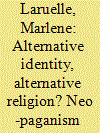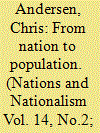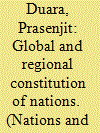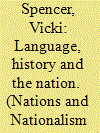|
|
|
Sort Order |
|
|
|
Items / Page
|
|
|
|
|
|
|
| Srl | Item |
| 1 |
ID:
081257


|
|
|
|
|
| Publication |
2008.
|
| Summary/Abstract |
As in all post-Soviet states, the Russian intelligentsia has been preoccupied with the construction of a new national identity since the beginning of the 1990s. Although the place of Orthodox religion in Russia is well documented, the subject of neo-paganism and its consequent assertion of an Aryan identity for Russians remains little known. Yet specialists observing the political and intellectual life of contemporary Russia have begun to notice that the development of references to 'Slavic paganism' and to Russia's 'Aryan' origin can be found in the public speeches of some politicians and intellectual figures. This article will attempt, in its first section, to depict the historical depth of these movements by examining the existence of neo-pagan and/or Aryan referents in Soviet culture, and focusing on how these discourses developed in different spheres of post-Soviet Russian society, such as those of religion, historiography, and politics
|
|
|
|
|
|
|
|
|
|
|
|
|
|
|
|
| 2 |
ID:
081260


|
|
|
|
|
| Publication |
2008.
|
| Summary/Abstract |
Between 1996 and 2001 the 'Métis population' of Canada skyrocketed from 204,000 to 292,000, an astonishing and demographically improbable increase of 43 per cent. Most puzzling about this 'increase' is not so much the unpersuasive explanations offered by statisticians and others but, more fundamentally, the underlying assumption that such a thing as a 'Métis population' exists at all. In contrast, I argue that such an idea constitutes an artifact of Canada's racial/colonial episteme in which 'the Métis' - formerly an indigenous nation invaded and displaced in the Canadian nation-state's westward expansion - have been reduced in public and administrative discourse to include any indigenous individual who identifies as Métis: reduced, in other words, to (part of) a race. The paper argues further that the authority of the Canadian census as a privileged forum of contemporary meaning-making in Canadian society is such that the lack of explicit Census categories to distinguish Métis Nation allegiance further naturalises a racialised construction of Métis at the expense of an indigenously national one
|
|
|
|
|
|
|
|
|
|
|
|
|
|
|
|
| 3 |
ID:
081259


|
|
|
|
|
| Publication |
2008.
|
| Summary/Abstract |
While the origins of nationalism are sought in global historical trends, few analysts have shown how nations themselves are constituted and re-shaped by circulating global power, ideas and models. The view from East Asia shows that these circulations are mediated by regional developments and interactions which bind these nations together in rivalry and interdependence. The histories of China, Japan and Korea have been closely tied together since the end of the nineteenth century and, with a gap of about thirty years during the Cold War, have intensified once again. The global and regional constitution of nations produces a dialectic between its global form and aspirations and misrecognition of this constitution arising from the self-perception of nationalism as historically immanent. This tension between the global constitution and national misrecognition contributes to the tenacity of nationalism. It also allows us to get a better grasp of the relationship between historical change and structure in nationalism and the relationship between state and popular nationalisms in the countries of the region
|
|
|
|
|
|
|
|
|
|
|
|
|
|
|
|
| 4 |
ID:
081255


|
|
|
|
|
| Publication |
2008.
|
| Summary/Abstract |
In contrast to the abstract commitment to individual rights found in liberal critics of Bill 101 and the equally ahistorical approach of multicultural theorists like Bhikhu Parekh, this paper proposes that the particular historical circumstances surrounding the current minority status of different groups is crucial in evaluating the legitimacy of one cultural group to promote its cultural needs over another group within existing states. When the culture of a group residing within a particular state is secure in a neighbouring jurisdiction, the issue at stake is not necessarily the survival of a unique culture but the cultural needs of particular individuals. It does not follow that they have no legitimate claims against the state. However, in examining the language policies in Quebec and the newly independent Baltic states, it is argued that they are different in kind to the rights due to long-standing communities struggling for linguistic surviva
|
|
|
|
|
|
|
|
|
|
|
|
|
|
|
|
| 5 |
ID:
081256


|
|
|
|
|
| Publication |
2008.
|
| Summary/Abstract |
To date, European identity has not mobilised a feeling of belonging or solidarity that would be comparable to the ways in which national identities stir people's passions and make them ready 'to die for' their nations. However, much of the related political debate and scholarly analysis has paid little attention to citizens' understanding of European identity and the way this relates to national identity. This paper aims to contribute towards filling this gap. It explores qualitatively the relationship between national and European identity among Italian citizens with a view to answering the following research questions: How do Italian citizens define Europe? Who is a European? How does feeling European relate to feeling Italian? How do citizens perceive the European integration process? The article is based on 24 qualitative interviews with Italian citizens of varying age, gender, locality of residence and socio-economic status, conducted in spring and summer 2003. The methodology adopted follows the discourse analytical tradition
|
|
|
|
|
|
|
|
|
|
|
|
|
|
|
|
| 6 |
ID:
081258


|
|
|
|
|
| Publication |
2008.
|
| Summary/Abstract |
In the wake of the 2006 'Cartoons Affair' which saw international protests by Muslims against the publication of cartoons depicting the Prophet Muhammad, it is clear that identity based on membership in the Islamic ummah goes far beyond simple religious affiliation. This essay presents a novel argument for treating the ummah (the transnational community of Muslim believers) as a nation. I begin with a theoretical treatment of the ummah as nation which employs historic and current interpretations of what constitutes nationhood. I then turn to the current state of the ummah; my findings present a potent nexus of information and communications technology (ICT), emergent elites, and Muslim migration to the West that has facilitated a hitherto impossible reification of the ummah. I also discuss how globalisation, Western media practices, and the nature of European society allow 'ummahist' elites to marginalise other voices in the transnational Muslim community. Based on the global events surrounding the Danish cartoons controversy of 2005-06, I conclude that there is need to recognise ummah-based identity as more than just a profession of faith - it represents a new form of postnational, political identity which is as profound as any extant nationalism
|
|
|
|
|
|
|
|
|
|
|
|
|
|
|
|
| 7 |
ID:
081254


|
|
|
|
|
| Publication |
2008.
|
| Summary/Abstract |
There is widespread agreement that nationalism emerged in the historical fountainheads of modernity, and was subsequently diffused outwards. Contrary to that, there is a long standing view that nationalism precedes modernity even in the broadly accepted cradles of both modernity and nationalism, such as England or France, neither of which was modern when it engendered nationalism. Besides, some emergent nationalisms ran concurrent with their English or French counterparts, with little evidence of having been spawned by diffusion. Such early or protonationalisms often sprang from resistance to foreign conquest, putting in doubt the invention-diffusion hypothesis. I am therefore suggesting that nationalism has not emerged in few societies, but in many, and that it was engendered by social interactions, not by a particular social formation. While nationalism emerges within society, its genesis occurs in-between social groups and societies, making it a product of their interactions. That makes it u-topic, its cradles socially diverse, and its conception interactional, not gestational
|
|
|
|
|
|
|
|
|
|
|
|
|
|
|
|
|
|
|
|
|